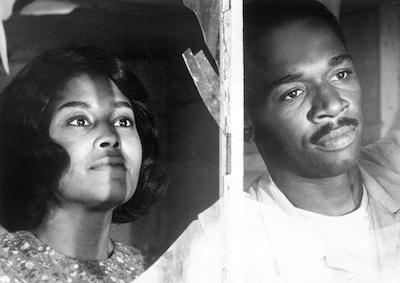Updated Jan. 10: While there is no immediate fire danger to the UCLA campus or the Archive’s collection in Santa Clarita, screenings scheduled for January 17–19 will be rescheduled out of respect for the guest speakers, staff and community members impacted by the devastation. New dates for these programs will be announced when possible. Our hearts are with the broader Los Angeles community. Please stay safe.
The Twilight Zone: “The Big Tall Wish”
U.S., 4/8/1960
In a rare showcase for an all-Black cast in early 1960s network television, Ivan Dixon delivers a deeply poignant performance as an aging boxer with only scars to show for years of painful defeats. With his best days seemingly behind him, he’s confronted by the immeasurable power of hopes and dreams via a small child (Steven Perry) who channels giant-sized beliefs into an alternate reality.—Mark Quigley
DCP, b&w, 30 min. CBS. Production: Producer: Bert Granet. Director: Ron Winston. Writer: Rod Serling. With: Ivan Dixon, Steven Perry, Kim Hamilton. Episode of The Twilight Zone courtesy of CBS Broadcasting Inc. Special thanks to Peter Murray.
Nothing but a Man
U.S, 1964
When a railroad worker named Duff marries Josie, an educated preacher’s daughter, the racial tensions of their small Alabama town tear at the threads of their new life together. The film was reportedly made on a microbudget of $230,000, and distribution was limited. With an all-Black cast, including non-actors from the community, the film broke new ground for the period by showcasing the dignity and resistance of Black people in the South in the face of systemic oppression. In a tour-de-force performance, Ivan Dixon portrays Duff with a roiling vulnerability opposite the quiet intensity of Abbey Lincoln’s Josie; the naked emotion between them bursts forth from the screen. Relatedly, director Michael Roemer deploys broken glass as a visual motif in the foreground and background throughout the mise-èn-scene: unexplained holes in the car windows, drinking glasses dropped to the floor, pointing to how too often women like Josie and Lee, Duff’s stepmother, are meant to gather the shards left by the demons rattling their men. A major achievement in the American neorealist tradition, it won the San Giorgio Prize at the Venice Film Festival in 1964. The film was named to the Library of Congress’ National Film Registry in 1993.—Beandrea July
35mm, b&w, 91 min. Director/Screenwriter: Michael Roemer. With: Ivan Dixon, Abbey Lincoln, Julius Harris, Stanley Greene, Gloria Foster.
Print preserved by the Library of Congress Film Preservation Lab in 2012 from original elements donated by director Michael Roemer.
Special thanks to Nomathande Dixon, Jacob Perlin, Andrew Adair, The Film Desk.
Watch a trailer:






 Mobile Navigation
Mobile Navigation

